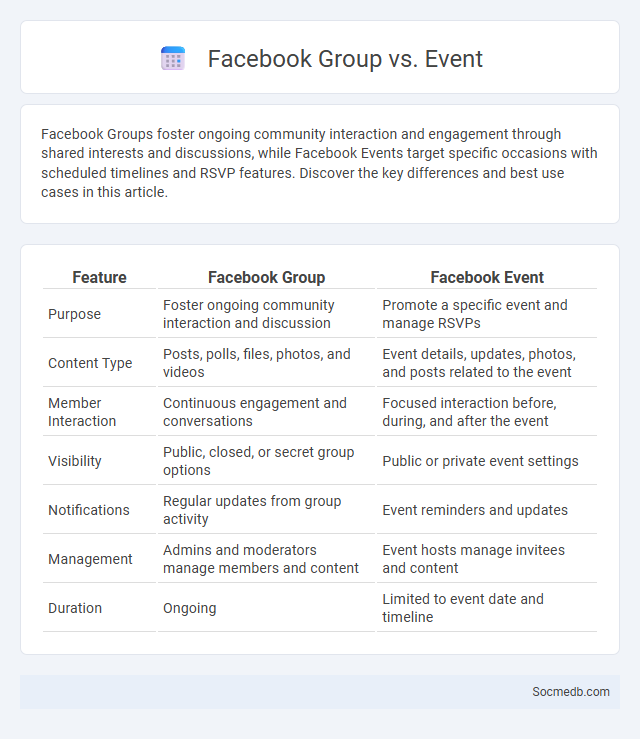
Photo illustration: Facebook Group vs Event
Facebook Groups foster ongoing community interaction and engagement through shared interests and discussions, while Facebook Events target specific occasions with scheduled timelines and RSVP features. Discover the key differences and best use cases in this article.
Table of Comparison
| Feature | Facebook Group | Facebook Event |
|---|---|---|
| Purpose | Foster ongoing community interaction and discussion | Promote a specific event and manage RSVPs |
| Content Type | Posts, polls, files, photos, and videos | Event details, updates, photos, and posts related to the event |
| Member Interaction | Continuous engagement and conversations | Focused interaction before, during, and after the event |
| Visibility | Public, closed, or secret group options | Public or private event settings |
| Notifications | Regular updates from group activity | Event reminders and updates |
| Management | Admins and moderators manage members and content | Event hosts manage invitees and content |
| Duration | Ongoing | Limited to event date and timeline |
Overview: Understanding Facebook Group, Event, and Page
Facebook Groups foster community interaction by allowing members to share content and engage in focused discussions, enhancing Your social connections. Facebook Events serve as powerful tools for organizing and promoting activities, enabling you to manage RSVPs and increase attendance efficiently. Facebook Pages act as brand or public profiles that provide a platform for sharing updates, marketing content, and engaging with a broader audience to build online presence.
Purpose and Use Cases of Facebook Groups
Facebook Groups serve as dynamic online communities designed to facilitate focused interactions among users sharing common interests, goals, or affiliations. They enable collaboration, information sharing, event planning, and peer support across diverse domains such as education, professional networking, hobbyist activities, and local community engagement. Businesses and organizations leverage Facebook Groups to foster brand loyalty, gather customer feedback, and create targeted marketing campaigns, enhancing user engagement and facilitating direct communication.
Benefits and Features of Facebook Events
Facebook Events offers powerful tools for organizing, promoting, and managing social gatherings, enabling users to create detailed event pages with customizable settings for privacy and invitations. The platform's integration with Facebook's extensive user base facilitates seamless RSVPs, timely notifications, and social sharing, enhancing event visibility and engagement. Features like calendar sync, real-time updates, and interactive discussion threads improve coordination and attendee communication, making Facebook Events a robust solution for both personal and professional event planning.
Key Differences Between Groups and Events
Groups on social media create ongoing communities centered around shared interests, enabling continuous interaction, content sharing, and collaboration among members. Events are time-specific, designed to organize and promote gatherings, allowing users to RSVP, receive reminders, and engage with event details before and after the occurrence. The key difference lies in Groups fostering long-term engagement versus Events facilitating timely coordination of specific activities.
Audience Engagement: Group vs Event
Audience engagement on social media varies significantly between groups and events, with groups fostering continuous interaction through discussions, shared content, and member collaboration, leading to deeper community bonds. Event pages typically drive short-term, high-intensity engagement focused on event promotion, updates, and live participation, often resulting in spikes of user activity around specific dates. Leveraging analytics shows groups excel in sustained engagement metrics, while events generate peak interactions aligned with event timelines, highlighting the importance of choosing the right format based on marketing goals.
Content Management and Moderation
Effective content management and moderation on social media platforms ensure a safe and engaging environment by filtering harmful or inappropriate posts while promoting relevant and quality content. Advanced algorithms combined with human oversight help detect spam, misinformation, and abusive behavior, enhancing user experience and maintaining community standards. Your active participation in reporting violations supports these efforts, fostering a responsible and respectful online space.
Privacy Settings: Group vs Event Comparison
Privacy settings on social media vary significantly between groups and events, affecting how your information is shared and controlled. Groups often offer more granular privacy controls, allowing you to choose who can see posts, members, and group activities, while events generally allow more public visibility to attract attendees. Understanding these differences helps you better protect your personal data and manage who accesses your social interactions on each platform.
Marketing Strategies for Groups and Events
Social media marketing strategies for groups and events leverage targeted audience engagement through platform-specific features like Facebook Groups, Instagram Stories, and LinkedIn Events to boost visibility and interaction. Utilizing user-generated content, event hashtags, and live streaming enhances community participation and drives real-time engagement. Data analytics tools enable precise tracking of attendee behavior and campaign performance, optimizing future event promotions.
Analytics and Insights: Measuring Success
Social media analytics and insights provide critical data on engagement metrics, audience demographics, and content performance, enabling brands to refine strategies and maximize ROI. Tools like Facebook Insights, Twitter Analytics, and Google Analytics track real-time user behavior, conversion rates, and sentiment analysis to measure campaign success accurately. Leveraging these data-driven insights empowers businesses to optimize posting schedules, target specific audiences, and improve overall social media effectiveness.
Choosing the Right Facebook Tool for Your Needs
Selecting the right Facebook tool depends on your specific goals, whether it's boosting engagement, scheduling posts, or analyzing audience insights. Tools like Facebook Business Suite offer integrated management features for small businesses, while platforms such as Hootsuite or Buffer provide advanced scheduling and monitoring capabilities. Understanding your budget, desired functionalities, and ease of use will ensure you choose the most effective tool to enhance your Facebook marketing strategy.
 socmedb.com
socmedb.com